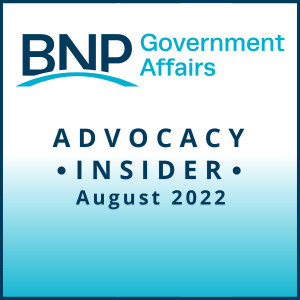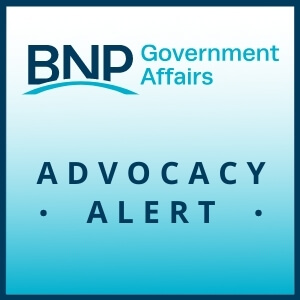Advocacy Alert: State Legislature Ends Session
The New York State Legislature gaveled out for the final time of the 2023 legislative session. Although a special session is possible before the end of the year, no major legislative push is expected.
Although much of the most impactful legislation being debated was tabled until next year, many important bills were passed in the waning days of session. A look at what moved and what didn’t:
Bills that Moved:
The following bills were passed by both the Senate and Assembly. Governor Hochul will need to approve them before they become law.
- Clean Slate. This legislation is a signature criminal justice reform that was the focal point of the final week of discussions. It will automatically seal the criminal records of formerly incarcerated individuals who have completed their sentence and do not reoffend for 3 years after misdemeanor sentence and 8 years after felony conviction. Effectively, the bill will prevent employers from seeing criminal histories of some applicants. Certain crimes, such as those that require the perpetrator to register as a sex offender, are not eligible for sealing.
- Public Work Oversight. This bill will require public employees to be on site for public works projects to ensure contractors are delivering project needs.
- Restrictions on Employer Political Speech. This bill would protect employees from retaliation for refusing to attend meetings that have the primary purpose of communicating an employer's opinion regarding religious or political matters. The sponsor aimed to stop “mandatory political rallies for a partisan candidate and meetings regarding an employer's opinion on specific legislation,” as well as meetings about unionism.
- Local Election Changes. The Legislature voted to move elections for town and county offices to even-numbered years. The move will drive up turnout in local races. However, critics say it will be detrimental to local governments because their elections would be overshadowed by state and national races.
- Workers’ Comp Increases. This bill would raise the minimum weekly benefit under Workers’ Compensation, thereby increasing premiums for employers.
Bills that Didn’t:
- Housing Issues. Despite being a focal point of Hochul’s State of the State, no housing reforms were enacted this year. The Legislature hoped to pass the Good Cause Eviction bill that would impose a statewide rent control model, but it did not gain enough support to move this year. We expect housing to be a focal point of the 2024 session.
- Extended Producer Responsibility. This major reform would have upended our current recycling system, forcing manufacturers to pick up the bill. Legislators opted against rushing through such a large change, but it will likely remain a focal point next year.
- Weekly Pay Clarification. A 2019 ruling in Vega v. CM & Associates Construction Management allowed a private right of action for manual workers who were not paid on a weekly basis. After the ruling, clarifying legislation is needed to help employers navigate this framework while ensuring workers are paid their duly owed wages. The BNP will continue to push for clarification on this issue.
- COVID Sick Leave. Since 2020, employers have had to provide 5-14 days of COVID sick leave, on top of regular sick time. The BNP joined many other business organizations in advocating for an end to this outdated policy, but the Legislature did not act on it.
- Employee Liens. The BNP strongly opposed a bill that would allow employees to claim a lien against their employer due to unsubstantiated allegations of wage theft. This radical proposal would be extremely harmful to all employers and runs contrary to the principle of “innocent until proven guilty.” Fortunately, the Legislature agreed.
- Benefits Cliff. The BNP supported a bill that would enable job training program graduates to continue receiving social service benefits. The Legislature did not pass this bill. In the budget, the state enacted a similar policy, but with a very low-income cap. The BNP is pleased by progress on this issue, but will continue pushing more aggressive action to bridge the benefits cliff.
- Ban on Buying Rental Properties. An Assembly bill would ban businesses from purchasing single-family houses and then renting them. This legislation did not advance, but the BNP will continue to monitor it.
- NYPA Nominee. NYPA is currently being led by interim director Justin Driscoll. Hochul nominated Driscoll to be the permanent head of NYPA. However, the Senate did not bring his nomination to a vote, effectively signaling its disapproval. Driscoll was criticized for raising concerns with the Build Public Renewables Act, which would force NYPA to build renewable energy generators. Since he is the interim, Driscoll will remain at the helm of NYPA. However, his nomination’s failure is yet another example of the Legislature’s heavy focus on aggressive energy and climate policy, and of the Legislature successfully pushing back on the Governor and her policy and personnel agendas.
Related Posts
BNP Advocacy Insider – August 2022
Our Monthly Members-Only recap of the latest Advocacy, and Government news.
7.28.22 Advocacy Alert: Congress Moving on Chips, Climate, Healthcare
After months of quiet negotiations and apparent gridlock, two major legislative updates came out of our nation’s Capitol last night. The U.S. Senate passed a landmark technology and innovation investment bill, and a key Senator announced support for a larger domestic spending package.
BNP Advocacy Insider – July 2022
Legislature Ends Year with Flurry of Activity The New York State Legislature gaveled out for the final time in 2022. Before doing so, it passed hundreds of bills that will head to the Governor’s desk for review. The BNP was in constant contact with state leaders throughout the last week,
7.6.22 Advocacy Alert: What Employers Need to Know About NY’s New Gun Laws
Before the Independence Day holiday, state lawmakers convened for a special session to enact new restrictions on firearm ownership. The new law makes stricter the process to obtain a concealed carry permit, imposes heavier regulation on safe firearm storage, and bans the sale of body armor. .



